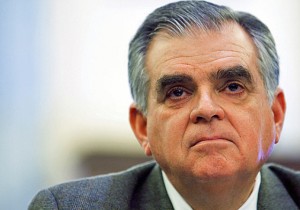
Toyota "failed to live up to its legal obligations," declares Transportation Secretary Ray LaHood as the government announces a record fine it hopes to levy against Toyota.
Toyota could face the largest civil penalty ever assessed against an automaker because it “knowingly hid a dangerous defect,” the nation’s top safety overseer, Transportation Secretary Ray LaHood, charged.
The maker may be required to pay a fine of $16.4 million, the largest allowed under the law, in connection with the recall of 2.3 million cars and trucks equipped with potentially sticky accelerators. The massive service action was announced in January, three months after another recall, involving 3.8 million Toyota vehicles, to deal with the possibility loose carpets could jam their accelerator pedals and cause the vehicles to race out of control.
“We now have proof Toyota failed to live up to its legal obligations,” which give an automaker only a brief window to report known safety defects to the National Highway Traffic Safety Administration, said LaHood.
“They knowingly hid a dangerous defect for months from U.S. officials and did not take action to protect millions of drivers and their families,” added LaHood, who has been a harsh critic of the Japanese maker, in recent months.
The fine could be a serious setback for Toyota, which has been struggling to put behind itself an ongoing safety crisis that has forced it to recall over 8 million vehicles to respond to complaints of so-called sudden acceleration. Just last week, spokesman Mike Michels told TheDetroitBureau.com, “I think the worst is over.”
Toyota had been showing some positive momentum, hefty incentives helping the maker boost March sales by about 35% over year-earlier levels and roughly double February volumes.
But a number of recent studies have suggested that Toyota’s support in the marketplace is becoming more brittle and will depend more heavily than ever on incentives, something the Japanese maker has traditionally shied away from. A March survey by AutoPacific, Inc. found that the number of American car buyers now considering Toyota products has plunged by more than 25 points, just over one in three.
The maker has been taking a more aggressive approach to dealing with the ongoing safety crisis, in recent weeks. It staged a well-covered news conference to refute the claims of a critic who claimed, during a Congressional hearing, that he could demonstrate that Toyota vehicles have defective electronic control systems. And it subsequently denounced a California motorist’s claims that his Toyota Prius raced out of control, reaching speeds of 94 mph before being brought under control.
How the automaker will handle the government’s charges remains to be seen, but Toyota officials will have two weeks to decide whether to pay the fine, negotiate a settlement – or possibly take the matter to court.
The previous record penalty paid by an automaker was $1 million. The fine was leveled against General Motors for failing to conduct a timely recall involving defective windshield wipers on more than 500,000 vehicles.
